"Les
Introuvables" (vol.1):
Les Introuvables du Chant
Puccinien
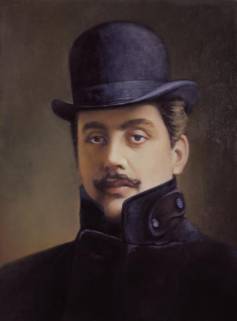
This series is addressed to the
connoisseur of rare historical opera recordings. The recordings presented in "Les Introuvables" have to fulfil three criteria before they are published:
they must be historical live-recordings; they must not be commercial
recordings; they must be of high artistic value. Commercial studio recordings
are only published when they are out of print, correspondingly hard to find and
of extraordinary high interest. The aim is to make outstanding non-commercial recordings
and private tapes accessible to a larger public. The focus is on tenors, but
other voices are not excluded. And now,
Sicelides Musae, paulo
maiora canamus!
Madama
Butterfly – New York 1946


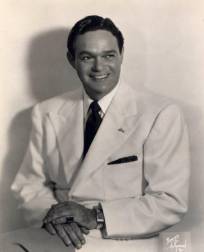
Cio Cio San Licia
Albanese
B. F. Pinkerton James Melton
Orchestra and Chorus of the Metropolitan Opera
House
Pietro Cimara
New York,
Metropolitan Opera House, 19 January 1946
Excerpts
About
this recording
Licia Albanese has
been the Metropolitan Opera's prima Butterfly assoluta during the years of
World War II and regularly appeared at the Met in the role of Cio-Cio-San until
1965. She has (at least for my taste) been one of the best interpreters of
Puccini's piccole donne in the history of singing. The recording presented here
is a broadcast recorded in January 1946, featuring Licia Albanese as
Cio-Cio-San and James Melton as Pinkerton under the baton of composer Pietro
Cimara. Cimara formed the score in a way that only great musicians can do,
carving out voices and structures that normally tend to be drowned out by Puccini's
rich orchestration, without forgetting the big lines and the drive in the score.
The enhancement of the strings just before "Con onor muore" for example is done
in such a striking way that it captures from the first second. Cimara was, as
can be heard in "Un bel dì", also a fantastic accompanist who knew how to lead,
to shape the music, the dynamics and the tempi, but at the same time to respect the singers
and the traditions. Albanese's Butterfly had everything that a Butterfly should
have: girlish sweetness, combined with heft, drama and emotion. The cue of "Un
bel dì" is delicate for all sopranos – a problem that Albanese solves in an
ideal way, not too low and not too loud, perfectly supported and with a sound
that is sweet and clear as a laser beam without being pushed. Every word she
sings is rich with expression, nothing is sung without meaning. The drama she
creates at the end of the opera is so credible because she never loses the
"girlish" expression. Albanese is a Butterfly who in the end sounds like a
suffering and desperate young woman, and not like a furious soprano drammatico
(as Tebaldi and Kabaivanska could at times). Personally, I have never been
more moved by any other Butterfly or by any other "Addio, piccolo amor ... va,
gioca, gioca." James Melton, who sang Pinkerton, was a "pleasant
well-rounded tenor" (F. Nouvion) who delivered an inconspicuous and solid
performance. Out of the tenors who sang Pinkerton in the Met's 1946 winter
season (Jagel and Kullmann), Melton was beyond doubt the most exciting choice.
This recording has
once been published on CD by the Bensar label but it is out of print and
correspondingly hard to find.
Madama Butterfly – Barcelona 1965
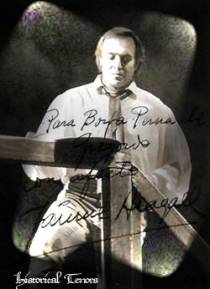

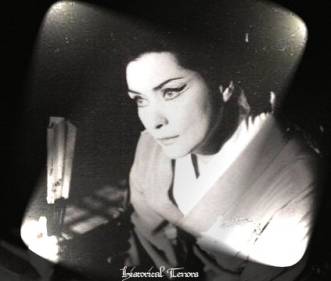
Cio Cio San Virginia Zeani
B. F. Pinkerton Jaume Aragall
Sharpless Manuel Ausensi
Orchestra and Chorus of the
Gran Teatre del Liceu
Franco Ferraris
Barcelona, Gran Teatre del Liceu, 12 June 1965
Excerpts
Bimba
dagli occhi (two fragments)
About
this recording
Jaume Aragall had very fine material without being able to make a long lasting career out of it. The period of his prime was short (approximately between 1965 and 1975), he soon lost high notes and self-confidence. I remember a couple of performances of Faust in Berlin in the early 1990s where he, during his big aria, paced around wringing hands, and failed. This recording of Butterfly presents Aragall at his peak. The voice is fresh, elegant, sleek and brilliant. His performance is furthermore distinguished by an unusually subtle musical feeling with great instinct for dynamics and tempo. His voice was not the biggest, which can be clearly heard in comparison with Virginia Zeani and Manuel Ausensi, the Sharpless of this recording. Zeani was a powerful Butterfly, even though her dramatic impetus tends at times to overrun the tenor. The duet from act 1 ends in the best high C that I have ever heard in this scene. Aragall generally had very nice high notes when he was in form. I remember a recording of Rigoletto where he ends his big aria in act two with one of the most beautiful high B flats that I can recall.
This is a private recording. House of Opera once issued a complete version on MC, but I cannot make any statement as to sound quality and availability.
Tosca – Genova 1965
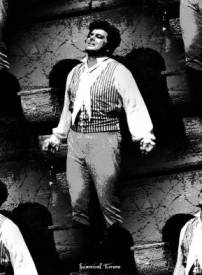

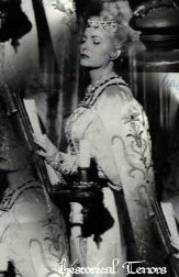
Mario Cavaradossi Gianni Raimondi
Floria Tosca Marcella
Pobbe
Scarpia Cornell
MacNeil
Orchestra e Coro del Teatro Comunale di Genova
Pietro Argento
Genova, Teatro
Margherita, 8 May 1965
Excerpts
Dammi
colori ... Recondita armonia
È
buona la mia Tosca ... La vita mi costasse
About this recording
Cavaradossi did not
play a very important role in the career of Gianni Raimondi. He sang the role
for the first time in 1960 and gave 21 performances as Cavaradossi in total,
according to Romano Raimondi's chronology. Raimondi was a very intelligent
singer who knew about the limits of his voice. That does not mean that
Cavaradossi was a role that Raimondi hardly could handle. Raimondi sang every
part with the necessary reserve, including Cavaradossi. Raimondi got
many offers for singing Chénier, Calaf, Manrico and Radamès, but he steadily
refused because he was aware of that he might not be able to go through them
with the reserve that always characterized his masterfulness. Cavaradossi was, as
this recording shows, no difficulty for Raimondi. The high B flat and the
following G in his opening aria are held very long, demonstrating a superb
control of breath. Some of the qualities that I have always admired Raimondi for
were the perfect passaggio and above all the condensed sound of his
acuti. No other tenor could concentrate the sound like Raimondi. That can also
be heard in the G sharp and the following high B in "Fa il confessore e il boia ...
La vita mi costasse", which Raimondi takes powerfully and effortlessly.
Tenors like Pavarotti, who neither had the heft nor the reserve for Cavaradossi,
always had problems in those four bars. "E lucevan" is another example of
how easy Raimondi went through the score. Again, his phrasing in this delicate
piece demonstrates superior breath control. The high notes are sung with
passion, but not (like in the case of Corelli) without taste. The icing on the
cake is his "O dolci mani", rich with beautiful pianissimi, which are – after
the tiring aria and the scene with Tosca – seldom heard in such perfection.
Gianni Raimondi – a wonderful Cavaradossi. Marcella Pobbe as Tosca could not
approximate his high level. MacNeil was a solid Scarpia, and it is always
exciting to hear his voluminous and pleasantly dark voice.
This is a private
recording.
La
fanciulla del West – Sassuolo 1977
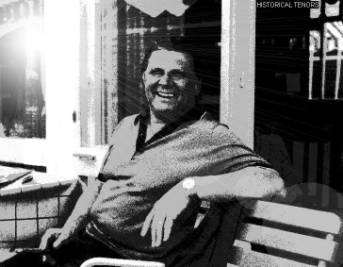
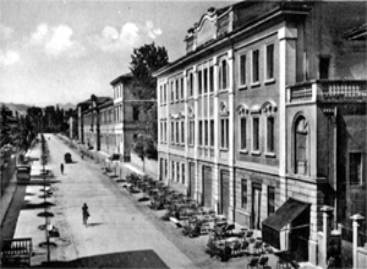
Ch'ella
mi creda, sung by Gianni Raimondi
from the Gianni Raimondi gala "Trent'anni di
un grande tenore"
Leone Magiera, pianoforte
Sassuolo, Teatro Carani, 3 February 1977
About this recording
In February 1977,
Gianni Raimondi was celebrating his 30-year stage jubilee with a concert at
the Teatro Carani in Sassuolo. Two other tenors participated in the concert:
Giuliano Ciannella and Sergio Bertocchi, as well as the sopranos Norma Palacios
and Kyoko Tsukada. Raimondi was 54 years old and about to end his career.
He was only to perform for two more years – not because of a vocal decline, as
this recording documents. Raimondi's voice was fresh and powerful as always.
Raimondi never sang La fanciulla del West on stage. "A pity", one is tempted to
say when listening to this thrilling performance. Apart from the aria from La
fanciulla del West, Raimondi sang: "Ah la paterna mano", "Amor ti vieta",
"Firenze è come un albero fiorito", "'O sole mio", "Tu ca nun chiagne", "Che
gelida manina" and "Addio, fiorito asil".
The recording was
published by Ars Nova, but has not been re-issued on Compact Disc.